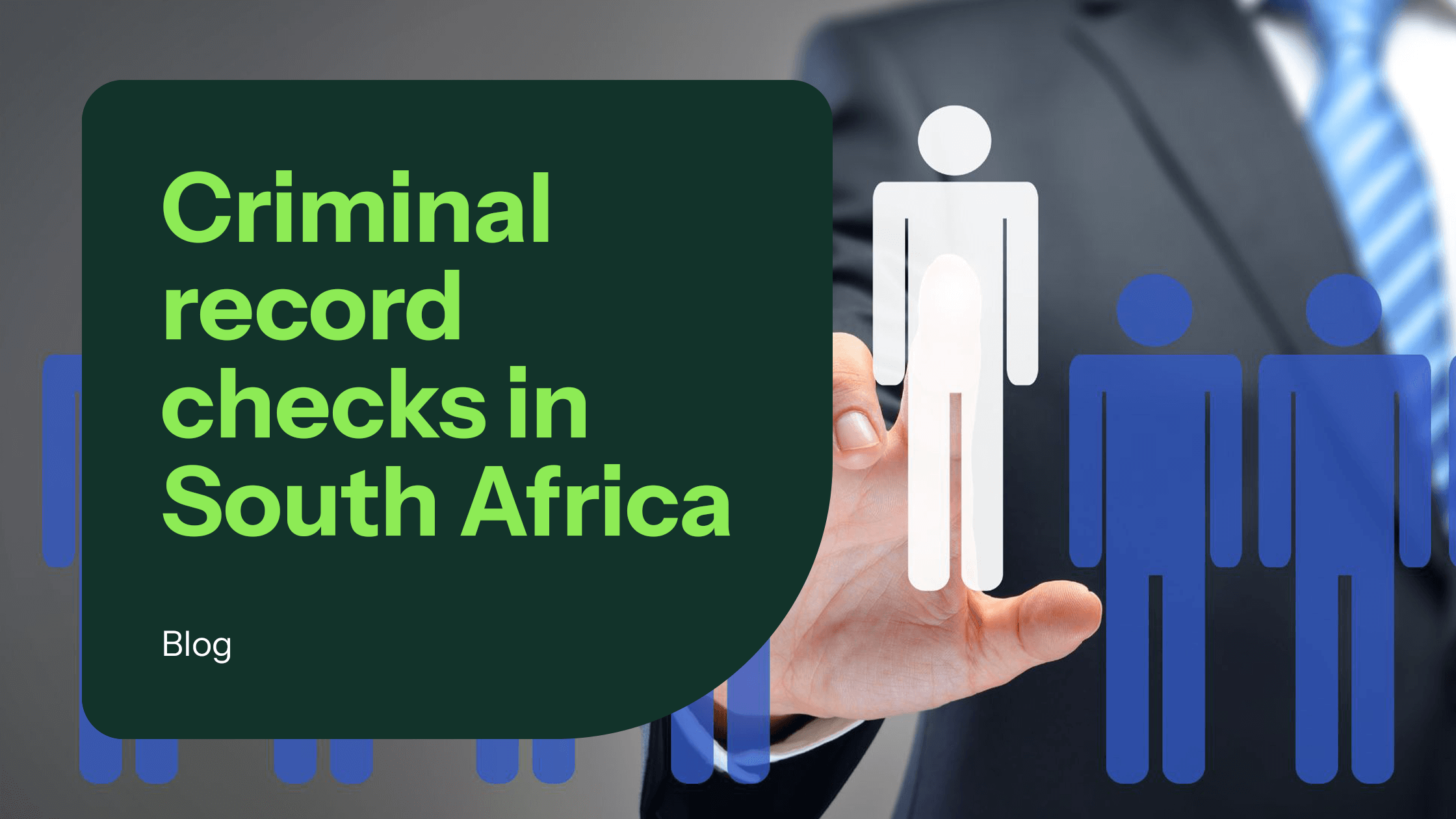As an employer, healthcare worker or school principal in South Africa, you may find yourself in a position where you must perform a criminal record check on an individual. Criminal record checks are an important part of the hiring process as they provide essential information about a potential employee’s history. Confirming their criminal record status will help you make informed decisions for all stakeholders concerned. This guide will discuss why criminal record checks should be a cornerstone of your employing strategy and how businesses, recruiters, healthcare workers, and educational institutions can benefit from performing a criminal record check.
Why are criminal record checks important for employers?
Criminal record checks continue to be an essential part of the hiring process for employers. In 2019, the South African National Prosecuting Authority (NPA) reported that there were 1.8 million people with criminal records in the country, and that over 800,000 of those individuals had been convicted of violent crimes. This makes it crucial for employers to identify and mitigate any risks associated with hiring individuals with a criminal history.
In 2022, the South African Police Service (SAPS) reported that there were 20,863 crimes committed in the workplace, with robbery, theft, and assault being the most commonly reported offences. In addition, a recent study conducted by the Institute of Security Studies found that 43% of businesses in South Africa experienced theft or fraud in the last two years, with the majority of these crimes being committed by employees.
These statistics highlight the importance of conducting criminal record checks on potential employees in South Africa. By identifying individuals with a criminal history, employers can reduce the risk of hiring individuals who may engage in illegal activity within the workplace. This is particularly important in industries such as healthcare, where patient safety is of utmost importance. Additionally, there are several examples of healthcare workers in South Africa stealing drugs or medical supplies, emphasising the need for thorough background checks.
Furthermore, employers who fail to conduct criminal record checks may expose themselves to legal liability. If an employee with a criminal history causes harm to others in the workplace, the employer may be held liable for negligent hiring. By conducting criminal record checks, employers can demonstrate due diligence and reduce the risk of legal action being taken against them.
Criminal record checks are a crucial part of the hiring process for employers in South Africa. By identifying potential risks associated with a candidate’s criminal history, reducing the risk of workplace crime, and protecting themselves from legal liability, employers can ensure that they are hiring the most qualified and trustworthy candidates for the job. Not only are criminal record checks important for businesses in South Africa, but they are also vital for educational institutions, especially when hiring teachers.
Can South African teachers have a criminal record?
Educational institutions need to exercise extreme caution when hiring teachers as they have a crucial responsibility in shaping the minds of the country’s future leaders. In recent years, there have been several high-profile instances of teachers in South Africa with criminal records, including cases of sexual assault and abuse of learners. But can teachers in South Africa be employed at schools if they have a criminal record?
The answer is: it’s complicated. According to the South African Schools Act of 1996, all teachers in South Africa are required to be registered with the South African Council for Educators (SACE) before they can be employed to teach in a public or private school. As part of the registration process, all applicants are required to undergo a criminal background check.
While having a criminal record does not automatically disqualify someone from teaching in South Africa, it depends on the nature of the offence and whether it is relevant to the teacher’s ability to carry out their duties. For example, if a teacher has been convicted of a serious crime such as sexual assault or violence, it is unlikely that they would be allowed to teach in a school.
In general, SACE will assess each case on an individual basis, taking into consideration factors such as the nature and severity of the offence, the length of time since the offence was committed, and the teacher’s overall fitness to teach. If a teacher is found to be unfit to teach due to their criminal record, they may have their registration revoked by SACE. Hence, schools and educational institutions shouldn’t hold back on criminal background checks. But it’s not only schools that will benefit from conducting background checks: businesses, recruiters, hospitals, and healthcare centres should be equally vigilant.
Benefits of obtaining a criminal record check
Obtaining a criminal record check can provide numerous benefits for businesses, recruiters, schools, hospitals, and healthcare institutions. Due diligence pertaining to the status of criminal records has many benefits, including:
- Reducing Risk: A criminal record check can help reduce the risk of hiring an individual with a criminal history. This can prevent incidents of theft, fraud, violence, or other criminal activities that could harm the organisation or its stakeholders.
- Compliance: Certain industries, such as healthcare and education, have legal requirements for conducting criminal record checks. Obtaining these checks can ensure compliance with regulations and prevent legal consequences.
- Protecting Reputation: Hiring an individual with a criminal history can damage the reputation of a business or organisation, particularly in industries that require high levels of trust and integrity. Conducting a criminal record check can help protect the organisation’s reputation by ensuring that only trustworthy individuals are hired.
- Ensuring Safety: Criminal record checks can help ensure the safety of employees, clients, and customers. For example, healthcare organisations can use these checks to screen potential employees who will work with vulnerable populations.
- Improving Quality of Hire: By conducting criminal record checks, businesses and organisations can identify potential warning signs in a candidate’s background, which can help make more informed hiring decisions and improve the quality of new hires.
How can businesses check a potential employee’s criminal record status in South Africa?
Checking for criminal records in South Africa is an important step in various situations, like recruiting new employees, renting out property, or engaging in activities that require a level of trust. When ensuring someone is trustworthy and reliable, a company like HURU is your trusted partner.
Companies like HURU are commonly known as background screening companies, and they provide services to various entities, including employers, landlords, and individuals who need to verify a person’s criminal history. Using background screening companies saves time and resources compared to applying for a Police Clearance Certificate (PCC). Huru has built a reputation for being reliable and efficient, providing clients with expertise and peace of mind.
Thanks to technology, background screening companies can make it easier than ever to help you check for a history of criminal records of individuals in South Africa. In the healthcare industry, criminal record checks are of utmost importance, especially in South Africa, where the safety and well-being of patients are a top priority.
What are the benefits of criminal record checks for healthcare and hospitals in South Africa?
Checking potential employees’ criminal record status can provide several benefits for healthcare facilities and hospitals in South Africa. Some of the benefits include:
- Patient safety: Healthcare facilities have a responsibility to ensure the safety of their patients, and this includes certifying that they are not hiring individuals with a history of criminal behaviour that may pose a risk to patients. Checking potential employees’ criminal record status can help identify individuals who may have a history of violence or abuse.
- Regulatory compliance: The South African healthcare industry is highly regulated, and healthcare facilities are required to comply with a range of laws and regulations related to patient safety and employee screening. Checking potential employees’ criminal record status can help ensure that healthcare facilities are meeting these requirements.
- Protecting the facility’s reputation: Healthcare facilities rely on their reputation to attract patients and healthcare professionals. Hiring individuals with a criminal records can damage a facility’s reputation and lead to negative publicity.
- Avoiding legal liability: If a healthcare facility hires an individual with a criminal record who goes on to harm a patient or employee, the facility may be held liable for negligence. By conducting criminal record checks, healthcare facilities can reduce the risk of hiring individuals who may pose a threat to others.
- Ensuring workforce integrity: Healthcare professionals are entrusted with sensitive patient information and may have access to drugs and other controlled substances. Checking potential employees’ criminal record status can help ensure that the facility is hiring individuals with a track record of honesty and integrity.
Why should recruiters use criminal record checks?
Recruiters in South Africa should use criminal record checks to comply with legal obligations and protect against financial and reputational risks associated with hiring individuals with criminal records. Criminal record checks can also help ensure the safety of employees and customers and inform better hiring decisions. Additionally, conducting criminal record checks demonstrates due diligence and can help protect recruiters from legal liability. Let’s further unpack some of the reasons:
- Legal compliance: Recruiters have a legal obligation to ensure that they are not hiring individuals with criminal records for certain roles. For example, the National Prosecuting Authority (NPA) Act requires certain positions, such as prosecutors, to undergo a criminal record check before being hired. By using a criminal record check service, recruiters can ensure that they are complying with these legal requirements.
- Risk mitigation: Recruiting individuals with criminal records can pose a risk to a business or organisation, including financial and reputational risks. A criminal record check can help recruiters identify any potential risks associated with a candidate’s background, allowing them to make informed hiring decisions.
- Protecting employees and customers: By conducting criminal record checks, recruiters can help ensure the safety and security of their employees and customers. This is particularly important for roles that involve working with vulnerable populations, such as children or older adults.
- Improved hiring decisions: Criminal record checks can provide recruiters with additional information that can help inform their hiring decisions. For example, a candidate’s criminal history may reveal patterns of behaviour that could impact their ability to perform the job effectively.
- Demonstrating due diligence: Conducting criminal record checks shows due diligence and can help protect recruiters from legal liability. In the event that an employee with a criminal record causes harm to others, the recruiter can demonstrate that they took reasonable steps to ensure the individual was qualified and safe for the role.
HURU is a criminal record check provider in South Africa that offers a range of services to help businesses, recruiters, healthcare facilities, and schools benefit from criminal record checks. Our services include comprehensive criminal record checks and continuous monitoring.
We also ensure that our criminal record checks comply with South African laws and regulations, including the National Prosecuting Authority (NPA) Act and the Protection of Personal Information Act (POPIA). Contact us today for a customised solution for your industry to ensure that criminal record checks meet specific industry-driven requirements.
The Simplest Way To Comply for The South African Council for Educators (SACE) Criminal Checks
South Africans can now run Criminal and Identity Verifications nationwide via an online portal


